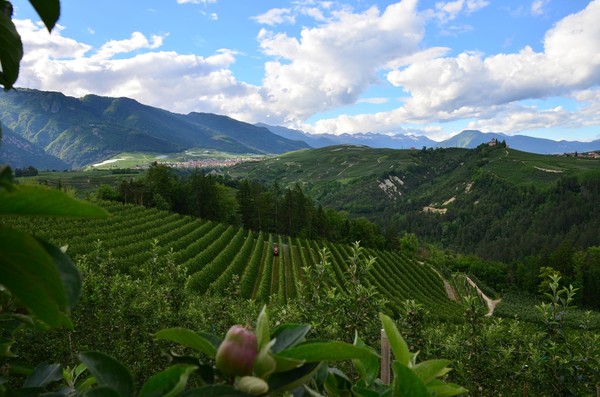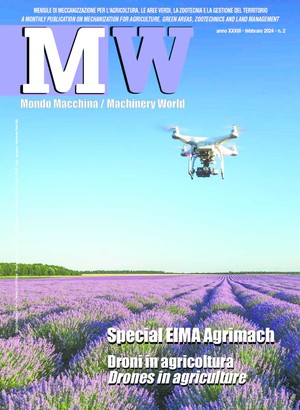
Development of mechanization: a map of incentives
The RDP is, by far, the most substantial measure to finance the purchase of agricultural machinery. However, a detailed analysis by region reveals the existence of many other tools that, in financing interventions for the improvement of firms' productive and energy efficiency, also provide funds for the purchase of agricultural and forestry machinery
The 2016 domestic market of machinery for agriculture, forestry and bioenergy chain was unsatisfactory, and showed a positive trend only by the end of the year, partly due to the increased number of funding applications (related to the RDP for 2014-2020) in the main regions, to marketing policies carried out by manufacturing companies and sales networks, and finally to the boost given to the sector by the EIMA exhibition, whose last edition was attended by a record number of visitors and traders. The RDP provides two types of measures that finance directly any purchase operation of machinery and equipment made by farms: Measure 4, Sub-measure 4.1 “Support for investments in agricultural holdings” and Sub-measure 8.6, that supports investments in technological innovation in forestry activities and in the processing, transport and sale of forest products, including the provision of machines and equipment. However, the trend in registrations varies by region, with an increase in tractor registrations in Lombardy and other northern regions and a drop in the southern regions, such as Campania and Puglia. On the other hand, the main national incentive in force to increase the sales of machines, which is provided by INAIL (National Institute for Insurance against Accidents at Work) will be available only by the end of April (after the extension of the deadline for the submission of applications). Pending the RDP funds, agricultural and industrial enterprises may use incentives provided by regional and local initiatives that, although not offering higher amounts can, however, support entrepreneurs in the renewal of the mechanical means through the acquisition of new generation technologies. There are in fact many different regional opportunities, not always known and therefore not always used by businesses, that deserve to be taken into account. Chambers of Commerce and business organizations are the references to learn about these additional regional aid channels for the purchase of mechanical means.The Regional Operative Programme for 2014-2020 linked to the European Fund for Regional Development, is the main extra-RDP tool that regions may use to support growth and employment, in line with the Europe 2020 strategy. Some axes of the programme give the opportunity to invest resources in machines and equipment, whether for agriculture, forestry or energy. Axis 1, dedicated to research and innovation, includes projects aimed at expanding the range of products and services and their technological and functional redefinition in an innovative way. Investments in agri-food, green chemistry, and energy may use non-repayable contributions. In this sense, even Axis 3 is very interesting, because it is focused on increasing business competitiveness by developing products and services. Micro, small and medium-sized enterprises are generally the beneficiaries of the incentives provided by the axis. The attached table gives an overview by region of the most significant actions to be undertaken in favor of different types of businesses.
Local opportunities in northern Italy
There are also typically regional and local initiatives that, although not numerous but useful and differentiated by objective and type of support, are addressed to the market of machinery. Lombardy uses the Programme for the Regional Development in the agricultural sector, the resources of which may be used to purchase machines and equipment. Mountain areas of Lombardy inspired regional law No. 31/2008, that provides interventions and investments in support of the agricultural sector. Lombardy was also involved in an initiative aimed at promoting research and experimentation in support of youth entrepreneurial development in mountain areas, as a result of an agreement signed at the end of 2016 between the Region and Unimont, the university of the mountain. Another measure is linked to the “Al via” invitation to bid, a support to production investments of micro, small and medium-sized manufacturing companies, whose lines of production require expenditures for the purchase of machinery, equipment and plants. Worth to mention is the action promoted by the Chamber of Commerce of Varese which grants non-repayable contributions to support micro, small and medium-sized agricultural businesses of the province, in the purchase of machines, plants (including plant components) and new equipment, as well as of plants for greenhouse heating and energy-saving systems. Piedmont has revitalized regional law No. 34/2008, Rules for the promotion of employment, quality, safety and regularity of work, that grants soft loans to newly-born enterprises and self-employed entrepreneurs operating in all sectors, except for agriculture. In this measure are also included investments in the industry of machinery. The 2016 Green Plan of Piedmont grants contributions on interest payment on loans in agriculture, with self-employed entrepreneurs as beneficiaries of the initiative. The objective of the intervention is the granting of loans, up to one year, useful to cover the costs of the technical means used in production cycles. The province of Biella offers the “Patto per il Biellese” (Pact for the Biellese), a provincial guarantee fund dedicated to self-employed entrepreneurs and SMEs, that allow enterprises finance product innovation with a counter-guarantee up to 90% of the guarantee issued by credit consortia.
In 2016, the Emilia Romagna Region benefitted from POS FESR 2007-2013 (Axis 2 – Activity II. 2.1), funds allocated the previous year for agricultural activities of enterprises hit by the earthquake. These initiatives are supposed to continue in force until the productive capacity recovery of the agricultural fabric. The Cassa di Risparmio di Ravenna grants aid for investments to agricultural enterprises in the purchase of plants, equipment and machinery with unsecured loan or mortgage up to 20 years.
Wood biomass plants are the beneficiaries of contributions granted by the Friuli Venezia Giulia Region. These funds are provided to enterprises and farms for the processing of wood. Eligible interventions are established for the purchase and installation of biomass boilers with a total rated thermal input between 35 kW and 100 kW, according to the applicant’s needs. The contribution is equal to 80% of the eligible expenditure for public entities and to 50% for other entities.
Veneto has established the Fund for the Development of the Production System. Production plants, machinery and equipment can be purchased by SMEs and their consortia through a mechanism of incentives based on a double funding system: a mix between a zero-rate public share and a private one (granted from banks or leasing companies) at a conventional interest-rate.
The Integrated Territorial Projects are an interesting opportunity given by the Tuscany Region. These projects provide the aggregation of both public and private entities within a Territorial Agreement to solve specific local problems and implement strategies aimed at mitigating climate change and adapting to it. Operations 4.1.5 (incentives to the renewable energy in agricultural holdings) and 6.4.2 (energy from renewable sources in agricultural holdings) can support the purchase of energy machinery with a total eligible cost of 500,000 euro for each PIT. Almost all of the regions have at their disposal funds for promoting the creation and growth of start-ups. Liguria, through the “Start & Growth” initiative, a part of the European Social Fund, promotes the production of goods in the sectors of industry, crafts, and processing of agricultural products. The invitation to bid is also open to young businesses under two years that could be in trouble. Umbria has regional law No. 12 of 23/3/1995, “Incentives to promote youth employment with the support of new entrepreneurial initiatives”. Individual or collective companies receive grants for the purchase of machinery, equipment, and plants, through advance funding up to 75% of investments without acquisition of guarantees. Even the province of Bolzano is involved in promoting the exploitation and creation of innovative and high-tech businesses with the start-up invitation to bid. The tender is in fact addressed to small enterprises with less than five years or to researchers that intend to establish, within three months, a business in the form of a joint-stock company. The incentives range between 50,000 and 200,000 euro, with a public share equal to the capital paid in by shareholders. The beneficiaries are businesses operating in the sectors of renewable energy, energy saving, agri-food technology, alpine technology, mechatronics and new materials. The province also grants incentives to build and expand biogas production plants in favor of all businesses operating in this sector. The total amount of contributions granted for these types of intervention is equal to 45% of eligible costs.
Local opportunities in southern Italy
Regions of southern Italy offer fewer but equally interesting opportunities. The Sardinian Regional Programming Centre published “Competitiveness increase of micro, small and medium-sized businesses through the support to tangible and intangible investments, consulting and educational services”, an invitation to bid for micro, small and medium-sized enterprises of at least two years.
Investments are addressed to all sectors, except for agricultural holdings, with a non-repayable grant between 10 and 70% for the cancellation of the share capital. Although the invitation to bid closed on December 31, it is supposed to reopen again in 2017. Puglia is financing production diversification of plants in order to get brand new products, that have never been manufactured before, through the “PIA Medie imprese” measure, dedicated to SMEs. Applications shall include integrated projects with a total amount of eligible costs between 1 and 40 million euro, as well as investments in research, with a non-repayable contribution between 35 and 45%. The Region also wishes to promote the development of economic activities for micro, small and medium-sized enterprises, by facilitating access to credit with the“Aid to Investments for Small and Medium-sized Enterprises Title II – Chapter III” measure. Eligible costs are established for the purchase of brand new machinery, plants and equipment, as well as for vehicles necessary for production cycles. In this case, a special contribution is granted to new plants.
Calabria recently published the POR invitation to bid that, from February 28, allows SMEs to apply for incentives in several sectors, among which agri-food and Smart Manufacturing, in order to promote business strengthening and restructuring processes. Eligible costs are established for brand new machinery, plants, and equipment. The maximum contribution granted is equal to 200,000 euro, covering up to 70% of eligible costs. Another initiative by the Chamber of Commerce of Cosenza grants a contribution to businesses that have invested in energy saving and efficiency, also through renewable energy plants. The contribution starts from 2,000 euro net and covers 60% of costs. Incentives are granted to micro, small and medium-sized enterprises for the purchase of plants, goods, and tools for the reduction of energy consumption and the improvement of energy efficiency in air conditioning and production processes.
Molise grants funding for the creation and exploitation of new enterprises through the Fund for the Development of Molise, with SMEs as beneficiaries of the initiative. The fund can cover up to 80% of the eligible costs and finance the purchase of tangible goods in various sectors. In Sicily, businesses have access to the Smart & Start Italia incentives, that provide non-repayable contributions and zero-rate funding to innovative and small-sized start-ups, with less than 4 years.
The local programme of incentives available to businesses also includes the provisions of the “National Plan for the Promotion of the Wine Sector” with non-repayable contributions. The plan, derived from the wine CMO, grants to regions funds to finance interventions in favor of wine companies formed by an individual or associated farmers, partnerships or capital companies in the agricultural sector. The regions will then manage investment procedures according to local needs. In this context, it is possible to invest in the purchase of containers for the aging and storage of wine, as well as of innovative machines and vehicles, with regard to efficiency of production.








